
Table of Contents
What is Globalisation?
Speaking of globalisation in layman terms, it refers to the expansion of ideas, knowledge, information, products, and services around the world. In a business context, Globalisation defines interconnected economies that are characterised by open trade, free Capital movement across nations, and easy access to foreign resources in order to optimise returns and benefits for the common good.

The convergence of cultural and economic systems is the driving force behind it. Increased engagement, integration, and interdependence among states are encouraged by this convergence. The globe gets more globalised when countries and areas become increasingly connected politically, culturally, and economically.
Causes of Globalisation
Globalisation is a well-established phenomenon. For a long period, the global Economy has become increasingly intertwined. However, the process of globalisation has intensified in recent decades due to a number of factors. These factors are as follow:
- Improvement in transport making global travel easier
- Better technology and internet facilities made communication convenient
- Growth of MNCs in different parts of the world
- Enhancement of global trade with a reduction in tariff barriers
- Increased and improved mobility of labour
- The rise of global trade organisations like ASEAN, SAARC, EU, NAFTA and so on has opened up gates for new trade
Advantages of Globalisation
Globalisation allows countries to gain access to lower-cost natural resources and labour. As a result, they are able to make things at a lesser cost that can be marketed internationally. Globalisation proponents claim that it benefits the globe in a variety of ways, including the following:
- Global competition fosters creativity and innovation while keeping commodity/service pricing in check
- Access to new markets and a variety of choices to choose from
- Developing nations have a better chance of achieving economic success and raising their level of living because of foreign direct investment
- Governments are more equipped to collaborate on common goals given that they have a competitive edge, enhanced capacity to interact and coordinate, and a global understanding of challenges
- Developing countries can reap the benefits of the latest technology without having to go through many of the growing pains that come with technological growth
Disadvantages of Globalisation
Many proponents see globalisation as a means of addressing Underlying economic issues. On the other hand, critics regard it as growing global inequality. The following are some of the criticisms:
- While outsourcing offers jobs to a population in one nation, it also removes jobs from another country, leaving many people unemployed
- There's a higher likelihood of illness spreading globally, as well as invading species wreaking havoc in non-native environments
- Loss of cultural identity is the major concern when people from diverse cultures interact
- Facilitates the scenario of global Recession
- There is a minimal international regulation, which is problematic since it might have serious ramifications for human and environmental safety
Talk to our investment specialist
Examples of Globalisation
Multinational Companies
These companies carry out their business and operations in different parts of the world. It exists because of globalisation. Apple, Microsoft, Accenture, Deloitte, IBM, TCS are a few examples of MNCs in India.
Intergovernmental Organisations
An intergovernmental organisation is a body controlled by international law that is made up of more than one national government-linked by formal treaties with the purpose of handling/serving shared interests. Organisations such as the North Atlantic Treaty Organization, the United Nations and the World Health Organization are examples.
Intergovernmental Treaties
Many nations throughout the globe have signed treaties or implemented trade policies to make international investment and commerce simpler. Free Trade Agreements of India, Agreement establishing the African Development Bank are a few examples of intergovernmental treaties.
The Bottom Line
Globalisation's promotion of more open borders and free commerce has both positive and negative impacts on the economy and people. It is an ongoing trend that is altering and maybe slowing down. Individuals, businesses, and governments must evaluate all sides of the globalisation problem in today's post-pandemic world and make decisions accordingly.
All efforts have been made to ensure the information provided here is accurate. However, no guarantees are made regarding correctness of data. Please verify with scheme information document before making any investment.




